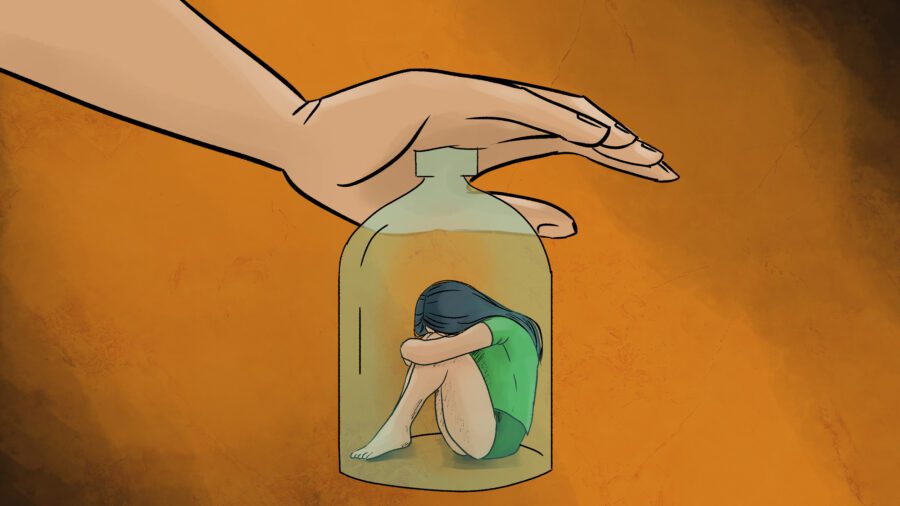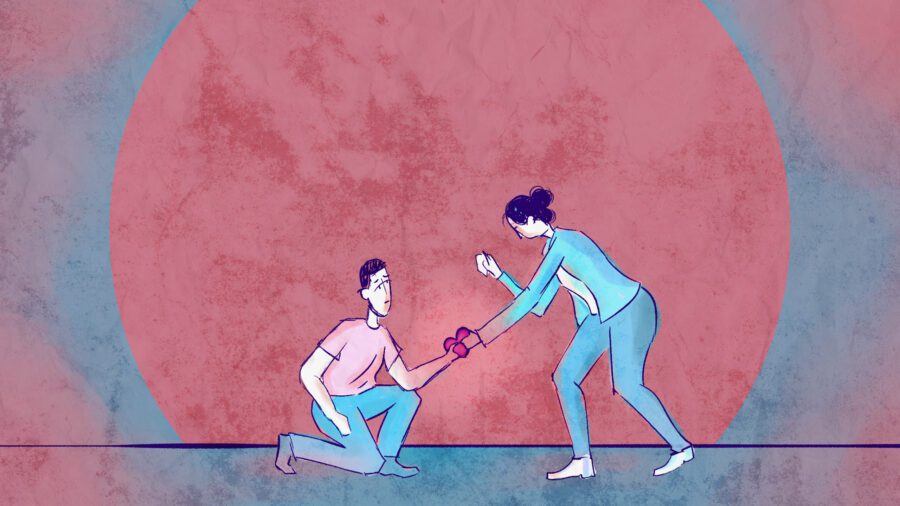
Learning to Love Your Inner Critic: Why Self-Love Is Stronger Than Self Degradation
Do you struggle with a negative internal voice?
Sometimes, our inner critics can motivate us to accomplish great things, but these little voices inside our heads can also cause us to experience self-degrading and defeating feelings. These feelings can hurt your self-worth and even be challenging for your mental health.
Fortunately, you can adopt practical tools and habits to quiet your harsh inner critic while cultivating higher degrees of self-care and self-love. In this article, you’ll learn all about your inner critic and how to bring more self-love to your internal voice.
What Is Your Inner Critic?
Your inner critic is that voice inside your head that observes all the mistakes you make or critiques your actions or behavior.
There’s nothing inherently wrong with having the self-awareness to notice when you can make improvements, but an overactive inner critic can lead to serious self-esteem issues and be exhausting for your emotional and mental health.
If you struggle with an overactive inner critic, you may also notice that your self-criticism is often not justified. Perhaps your internal voice is hard on you when you stumble over your words in conversation or make another trivial error.
When your inner critic nags you too often over minor things, you can develop problems with your confidence and self-perception. These feelings of self-criticism may not even be rooted in reality, as is the case with many who struggle with anxiety.
For example, you may feel as if you were awkward at a social gathering, and despite the fact that no one else thought you were awkward, you may struggle with feelings of self-loathing and social inadequacy.
Your inner critic may also undermine your accomplishments and cause you to develop imposter syndrome, meaning that you feel incompetent and like you didn’t actually earn your achievements, such as your career.
If you’ve ever been the victim of emotional abuse, you may have developed an exhausting, unhealthy self-critic that stems from your past mistreatment, but a person can struggle with a self-degrading inner critic for a variety of reasons including mental health struggles, such as depression or anxiety, or your cultural or social background.
Remember, numerous people struggle with unhealthy inner criticism, and it’s perfectly appropriate and normal to seek mental health treatment to help you. If your inner critic is causing you to struggle with your self-esteem or mental and emotional health, consider contacting a mental health professional such as a therapist or psychologist.
In addition to seeking mental health assistance, you can use helpful guidance to calm your inner critic and embrace self-love.
“Loving yourself” can sometimes sound like an abstract concept, but there are actionable tools you can use to begin cultivating self-love.
How to Forgive Yourself
Sometimes, our mistakes lead to our inner critics becoming harsh and unhealthy.
Regardless of the mistakes you’ve made in your life, it’s important to remember that everyone makes them, and it’s better to learn from your errors than to dwell on them in an unhealthy way.
Contemplating your mistakes to the point where they fester will likely cause your inner critic to be all the more damaging, and these negative thoughts can create a vicious cycle that leads to self-hatred. It’s critical that you move on from your mistakes rather than allow them to control your life.
You can begin to move on by detaching your identity from your mistakes. Acknowledging your guilt is perfectly acceptable, but don’t believe yourself to be a terrible person based on a mistake you made. Your guilt is a sign that your mistake bothered you, and you can learn from the experience and avoid making the same error again.
Rather than focusing on the mistake itself, you can focus on the lesson you learned and how it will impact the rest of your life and enable you to become a better person.
This doesn’t mean our mistakes shouldn’t have consequences, though. If you did something illegal or harmful, your guilt is there for a reason — you need to make things right. The path to forgiving yourself will begin with owning up to your mistake.
For example, if you said something incredibly hurtful to your spouse that negatively impacted your relationship and now you feel tremendous guilt about it, moving on will require you to apologize and make things right.
Another effective way you can begin to forgive yourself is through journaling. Write down what you’re feeling and what you did that justifies your harsh negative criticism. You’ll find that although you made a mistake, you aren’t hopelessly awful and beyond forgiveness.
Going back to the example involving your spouse’s hurt feelings, you could write, “I’m feeling like a cruel, insensitive person.” If you’ve already made things right with your partner, you could journal about how although you made a mistake, that doesn’t mean you’re doomed to repeat it. You are not a cruel or insensitive person — you made a mistake, and now you’re choosing to learn from it.
Give yourself grace and compassion, and remember that everyone makes mistakes. Otherwise, your inner critic may dwell on this error and make you feel like you can’t improve.
Overcome False Beliefs
Those who struggle with a harsh inner critic often have self-deprecating thoughts based on self-perceived deficiencies.
Often, these deficiencies aren’t even rooted in reality, such as believing yourself to be dumb or incompetent regardless of your intelligence or skills.
Part of overcoming your harsh self-critic and embracing self-love is addressing and overcoming these limiting, false beliefs about yourself, and the first step in getting past these false beliefs is understanding them.
We don’t always immediately recognize how we’re feeling, and sometimes we may attribute our deeper, more complex emotions to a more basic surface-level emotion, such as anger or stress.
Our negative emotions are frequently multifaceted and rooted in self-doubt and self-loathing. You can uncover your more complex emotions and false beliefs about yourself through journaling and being willing to recognize why you feel deficient.
For example, your inner critic may feel frustrated with you because you didn’t go to the gym today, and this feeling of frustration could be rooted in false beliefs you have about your body. If you journal out your underlying feelings and beliefs, you may uncover a negative self-perception of your body that’s not rooted in reality.
Recognizing your false and limiting beliefs about yourself is an important step to developing a gentler, more constructive inner critic. If you believe yourself to be deficient in the different aspects of your life, you could develop a mean, unhelpful inner critic that hurts your self-esteem.

Learn The Secrets Of Some Of The Greatest Minds In The World
The Greatness Mindset shows you how to unleash your greatness by clarifying who you are, discovering your Meaningful Mission, and stepping into how you can make an authentic, unique contribution to the world.
Learn MoreBe Nice to Yourself
Regardless of where you are on your journey in the different facets of your life, you need to show yourself grace and be kind to yourself. No one is perfect, and we all have room for growth.
Having a severe inner critic who frequently observes where you fall short in life isn’t helpful for your long-term growth. Instead, it’s better to embrace positive thinking and be nice to yourself, and this will even help you make positive changes in your life.
A substantial part of being kinder to yourself is expressing gratitude, even during challenging times. This may sound insincere, but you can position your thinking to exhibit gratefulness. For example, if you’re having a tough year, you shouldn’t lie to yourself about the challenges or adversity you’ve faced, but you can be thankful for the lessons you learned along the way and how the experiences have shaped you.
Expressing gratitude releases dopamine and serotonin in your brain, enhancing your overall wellbeing and motivation. When you feel better about yourself and have a greater drive to accomplish your goals, you’ll have an easier time overcoming self-doubt and quieting your inner critic’s unhelpful negative feedback. This will also help you gain more confidence to achieve more and unlock greater potential.
Embrace Self-Acceptance and Don’t Compare Yourself to Others
A common source of dissatisfaction and self-loathing is comparison-itis — when you compare yourself to others and envy what they have.
It’s no secret that social media has worsened how people compare themselves to others. We’re surrounded by reminders of others’ success and happiness through filtered pictures and videos, but people only post the more polished, impressive aspects of their lives and leave out the rest.
This doesn’t stop us from feeling insecure though, and we can fall into the trap of feeling deficient compared to others. It’s easy to feel envious of your friends’ seemingly perfect relationships, children, careers, and accomplishments, especially because they likely don’t post about their insecurities, problems, and inner critics.
An important step to embracing self-love and overcoming your unhelpful inner critic is accepting yourself for who you are and recognizing that no one is perfect. You can begin to accept yourself by letting go of how you measure up compared to others.
Even if you stay off social media, you will always have times when your inner critic wants to compare you with someone else, whether a friend or a stranger you see in public.
When your inner critic speaks up and insists on offering you negative feedback, you can replace what it has to say with positive affirmations. If you’re feeling insecure about your intelligence compared to a friend, for example, you can say, “I am smart, and I am also growing in my intelligence every day.”
Another essential part of developing self-acceptance and love is surrounding yourself with the right people. It’s better to be around positive people who lift you up and encourage you rather than keep company that makes you feel worse about yourself.
Challenging Yourself to Practice Self-Care
Our negative inner critics can gain strength and influence in our lives for a variety of reasons, and at times, it can be challenging to identify why we’re so hard on ourselves. Sometimes, part of the underlying problem with our inner critics has to do with a lack of self-care.
We may be feeling burnt out or stressed, which can impact how we talk to ourselves. Consider implementing different practices in your life that can reduce stress and improve your overall mental and emotional health.
For example, it may be time to start eating healthier and exercising regularly. Exercise causes your brain to release endorphin hormones, which reduce stress, and it also releases dopamine and serotonin. Although exercise and healthy eating take time and effort, these tools can do wonders for your sense of wellbeing.
Another critical part of your self-care is getting sufficient sleep. Sleep deprivation has been shown to reduce your focus, memory, and decision-making abilities, and it can cause you to become more stressed and anxious.
You’re likely aware that you need at least eight hours of sleep per night, but it’s easy to justify sleeping less when you’re busy. Regardless of how busy you are, you need to get enough sleep to recharge, and this directly impacts your emotional and mental health, including your self-esteem and inner critic.
Finally, setting goals is a surprisingly important part of self-care and self-love. You need to be working toward something, even if it’s something small. That way, your body will produce dopamine, and you’ll have a better sense of wellbeing as you work toward your goals.
Your first goal doesn’t need to be something huge. In fact, if you’re struggling with self-esteem and a harsh inner critic, it may be helpful to start with something small that you enjoy, such as a pastime like tennis or piano. When you set goals for an activity that brings you pleasure, you’ll have an easier time creating a consistent routine to progress and actualize your goals.
The key is to focus on your overall continual growth. You set and achieve goals to stimulate your brain and continue progressing in your life. This will help you feel more motivated, positive, and confident, all of which are critical parts of developing a more loving inner voice.
Join In 200 Million+ On The Journey to Greatness
Take the Next Steps to Develop Strong Self-Love
If you’ve made it through this article, you’ve put in the effort to begin working on yourself and your self-love, and that’s awesome! You can continue learning more about cultivating self-care and calming your harsh inner critic by reading other resources on our site as well as other sites like GoodTherapy.org and Mindbodygreen.com.
Remember, you’re not alone if you struggle with your mental health. There are resources available online to connect you with a licensed mental health professional including Better Help and the National Institute of Mental Health.
You deserve a loving, beneficial inner voice. Use these tools and mental health services to overcome your toxic inner critic and live more joyfully!
Greatness Authors
Greatness Authors is a collection of writers, thinkers, curiosity experts, and students of the world who are committed to bringing you the most up-to-date, impactful, and inspiring information surrounding Greatness topics.

How to Have a Healthy Romantic Relationship Even if You Share Different Beliefs

13 Tips to Help a Parent Transition into Assisted Living with Care & Respect

Take Your Power Back: 9 Subtle Signs Your Partner Is Gaslighting You

Apologizing 101: How to Apologize from the Heart & Mend Your Mistakes Without People Pleasing

The Ultimate Guide to Finding “the One,” According to Relationship Expert Stephan Speaks










